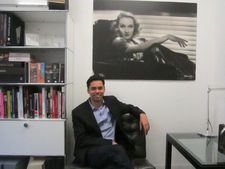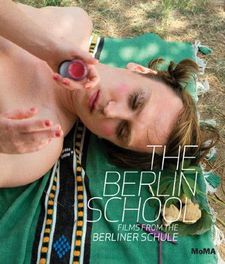Rajendra Roy, the Celeste Bartos Chief Curator of Film at the Museum of Modern Art in New York City, is organising, together with independent film critic Anke Leweke, The Berlin School: Films from the Berliner Schule at MoMA running from November 20 through December 06, 2013. Some of the filmmakers participating are Christian Petzold, Thomas Arslan, Angela Schanelec, Maren Ade, and Ulrich Köhler. Following a discussion on his "first time directing" the annual Kino! New German Cinema program, we looked into the future of German film at MoMA.
 |
| Rajendra Roy at MoMA. Photo by Anne-Katrin Titze. Photo: Anne-Katrin Titze |
Anne-Katrin Titze: Where are you headed after KINO! and the Weimar Touch, the influence of German cinema (April 3 – May 6)?
Rajendra Roy: There will be a series in November on Berlin School. The commitment and role MoMA has played in the introduction of new German cinema, back in the Seventies continues to this day with our interest in collaboration with the Fassbinder foundation. I am currently co-authoring a book on the Berlin School.
AKT: What are you planning to highlight with the Berlin School?
RR: Christian Petzold is the most known at this point. Barbara was kind of, let's say, a breakout hit. Thomas Arslan and Angela Schanelec (Mein Langsames Leben - Passing Summer) are the other two, kind of, principals associated with the founding, which should be used very loosely, because even they insist that the Berlin school really doesn't exist. It's more of a critical designation than an actual collaborative. There's no dogma, no manifesto in the traditional sense. Newer figures are people like Maren Ade and Ulrich Köhler, who is actually her partner. Names are starting to emerge, these are second generation, like Benjamin Heisenberg. It's a movement that's profoundly influential, certainly in Europe. A lot of people emulating the very intense aesthetic and controlled narratives that are associated with the Berlin School. But it doesn't have a popular following at all, even in Germany.
AKT: How would you summarise the Berlin School style?
RR: There's an embrace of realism. Any kind of theatrical flourish, whether it's a musical score, which are pretty rare, other than music in situ. Clean lensing, very direct mise-en-scène, not a lot of accidental, other than the kind of unexpected choices made by the characters. It's a very present tense cinema, not really referencing the past. It's an undetermined future.
AKT: Barbara fits the bill. It is a very present tense film.
RR: Exactly. In an odd way period but very present tense. To make a period film in that style also is showing progress. And eventually it will be declared that school is out, Berlin School is out. This is just kind of a natural evolution.
AKT: You are hoping to reach a new audience at MoMA with a program like the Berlin School?
 |
| The Berlin School: Films from the Berliner Schule |
RR: I am interested in taking those audiences to the next level. So if you are interested in new German film why not take a look at it in the context of what's happening globally. Starting to show those threads is really interesting.
AKT: Where are the threads leading?
RR: There were two films produced in Africa, which I find totally fascinating because you couldn't think of a less clinical environment, if you think of Germany as a place of clinical aesthetics, very clean cinematography, and there's this kind of hot wild energy in Africa to translate. I think it's a fascinating challenge. Schlafkrankheit, Sleeping Sickness, which is Ulrich Köhler's film from a few years ago is a good example of that. It sets up that oppositional relationship between the expectations of German society and this totally different scenario where this doctor is in Africa.
The Berlin School: Films from the Berliner Schule is accompanied by a fully illustrated catalogue, edited by Rajendra Roy, Anke Leweke with texts by Thomas Arslan, Valeska Grisebach, Benjamin Heisenberg, Christoph Hochhäusler, Nina Hoss, Dennis Lim, Katja Nicodemus, Christian Petzold, Rainer Rother to be published in November.





















